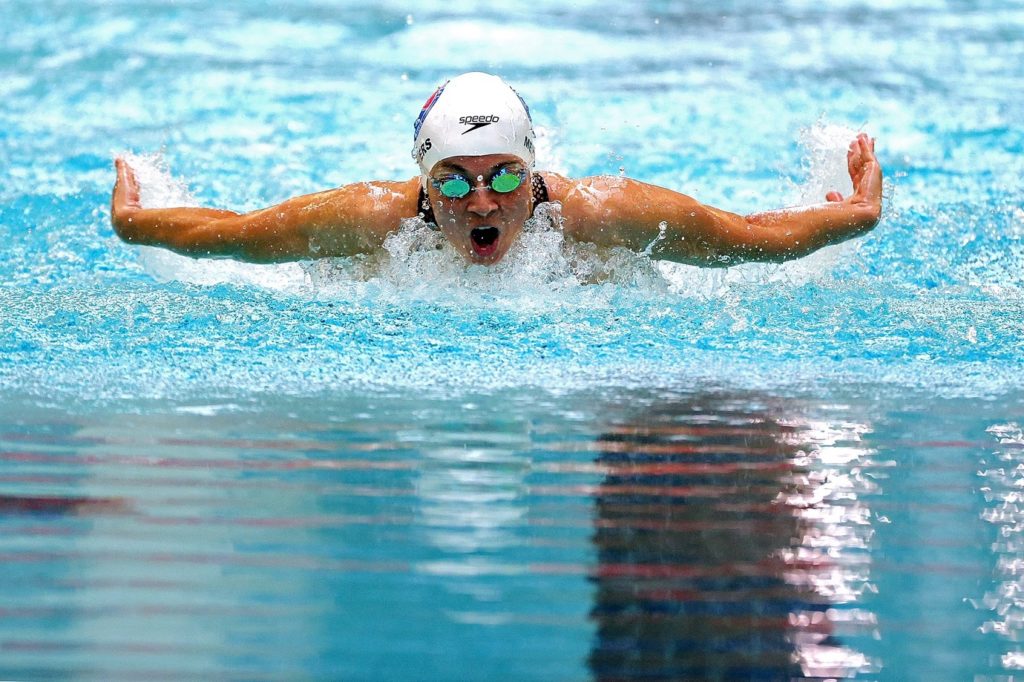American swimmer Becca Meyers has withdrawn from the Tokyo Paralympics after she said organisers denied her request to bring a personal care assistant with her to the Games.
Meyers is a deaf-blind swimmer and was born with Usher syndrome, a condition affecting both her hearing and vision. She is a two-time Paralympic champion and six-time medallist. At the 2016 Rio Paralympics, Meyers won three gold medals.
She said her request for a personal care assistant was denied by the United States Olympic and Paralympic Committee due to the COVID-19 restrictions in place in Tokyo.
In an opinion piece published by USA Today, Meyers said the only reason many athletes with disabilities are able to compete in a setting like the Paralympics is because of personal care assistants.
“They help us navigate these foreign venues, from the pool deck, athlete check-in to finding where we can eat. But the biggest support they provide athletes like myself is giving us the ability to trust our surroundings – to feel at home for the short time we’re in this new, unfamiliar environment.”
For it to be deemed not essential for Meyers to have a personal care assistant with her in Tokyo, is all the most shocking, according to the swimmer, because the Paralympics “are supposed to be a haven for athletes with disabilities”.
“The one place where we are able to compete on a level playing field, with all amenities, protections and support systems in place,” Meyers wrote.
In a statement on Twitter, Meyers said the United States Olympic and Paralympic Committee repeatedly denied her reasonable and essential accommodation request as an athlete with a disability. She was told there would be one personal care assistant available on staff to aid 33 other Paralympic swimmers, 9 of whom are visually impaired.
“So, in 2021, why as a disabled person am I still fighting for my rights?” Meyers said.
Heartbroken to share that I’m withdrawing from the Tokyo Paralympic Games. The USOPC has repeatedly denied my reasonable and essential accommodation because of my disability, leaving me no choice. Full statement below: pic.twitter.com/p9tKsbPip2
— Becca Meyers (@becca_meyers) July 20, 2021
If you believe the International Olympic Committee and the International Paralympic Committee, this year’s Games in Tokyo are supposed to be a “landmark in gender equality on and off the field of play”. The Games are supposed to be “paving the way for a more equal and inclusive society”.
According to the committees, 40.5 per cent of the athletes competing at the Paralympics this year will be women, and almost 49 per cent of athletes competing at the Olympics are women. While this is progress on a strictly numbers basis, there’s been a myriad of discriminatory issues crop up in recent weeks that have sidelined the needs of women, and athletes with disabilities – Meyers’ story is a case in point.
There’s has been the banning of a swimming cap brand specifically designed to fit over thick hair, braids and afros. FINA, the International Swimming Federation, said Soul Cap swimming caps were not allowed because the products “did not fit the natural form of the head” and were not necessary for athletes. After fierce backlash and claims of racism and exclusion, FINA said it is now reviewing its decision.
As many of us are aware, COVID-19 restrictions have severely limited the number of people who can attend the Olympics. And until last month, the restrictions extended to babies of breastfeeding mothers who are competing as athletes. Pleas from female athletes helped to change the restrictions on babies, and now a number of athletes who have recently given birth are able to take their babies to Tokyo with them.
And, let’s not forget that in February, the head of the Tokyo Olympic Organising Committee, Yoshiro Mori, was forced to resign after he declared that women “talk too much” in board room meetings.
There’s no doubt that in the pandemic, pursuing an event like the Olympics is mammoth task for organisers, and the health of all involved must be prioritised. But there’s no excuse for sidelining athletes with disabilities and women in the process.


